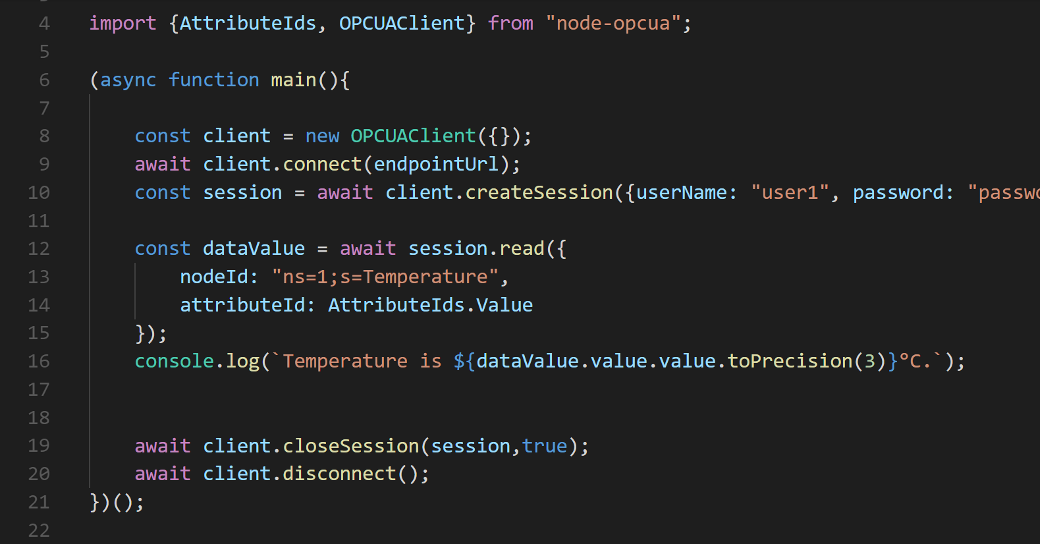Node-Opcua 0.2.0 will make it easier than ever to write OPC-UA Client code

Since node-opcua@0.2.0, it’s possible to take advantage of the latest Javascript ES2017 feature such as async/await.
If you are using nodejs 8 or above, most of Javascript 2017 new features are natively supported, and writing a simple OPCUA client has never been so easy.
Let’s have a look,
const endpointUrl = "opc.tcp://opcuademo.sterfive.com:26543";
const opcua = require("node-opcua");
const AttributeIds = opcua.AttributeIds;
const OPCUAClient = opcua.OPCUAClient;
(async function main(){
const client = new OPCUAClient({});
await client.connect(endpointUrl);
const session = await client.createSession({userName: "user1", password: "password1"});
const dataValue = await session.read({nodeId: "ns=1;s=Temperature",attributeId: AttributeIds.Value});
console.log(`Temperature is ${dataValue.value.value.toPrecision(3)}°C.`);
await client.closeSession(session,true);
await client.disconnect();
})();
This simple program establishes a connection to a remote OPCUA Server, opens a session with some credentials, reads a variable value out of one of the temperature sensor exposed by the OPCUA server, print out the value, and shutdown the connection properly.
The code looks sequential, but almost every await statements are in fact asynchronous calls that perform a round trip transaction with the remote server.
This also works in TypeScript. Modern IDE such as Visual Studio Code or WebStorm provides intelisense support Typescript. This gives great user experience to explore the rich NodeOPCUA API and also statically check your code against the API signature.
All you’ll have to do is replace those 3 line:
const opcua = require("node-opcua");
const AttributeIds = opcua.AttributeIds;
const OPCUAClient = opcua.OPCUAClient;
with:
import {AttributeIds, OPCUAClient} from "node-opcua";
Wait a minute! the node version I am using doesn’t support await/async natively !
Async-await have been available since Javascript ES2017 and Node.js v8.0 or above. But, if your application still relies on older version of node (6.0 or 7.0), you can still use the Promise version, in a less convenient but still practical way.
const endpointUrl = "opc.tcp://opcuademo.sterfive.com:26543";
const opcua = require("node-opcua");
const AttributeIds = opcua.AttributeIds;
const OPCUAClient = opcua.OPCUAClient;
(function main(){
const client = new OPCUAClient({});
let the_session = null;
client.connect(endpointUrl)
.then(function() {
return client.createSession({userName: "user1", password: "password1"});
})
.then(function(session){
the_session = session;
return session.read({
nodeId: "ns=1;s=Temperature",
attributeId: AttributeIds.Value
});
})
.then(function(dataValue){
console.log(`Temperature is ${dataValue.value.value.toPrecision(3)}°C.`);
}).then(function() {
return client.closeSession(the_session,true);
}).then(function() {
return client.disconnect();
});
})();
Alternatively, you could use the async/await typescript code and get it transpiled for Javascript ES6.
my node version is so old that it doesn’t support Promise either !
However, if you’re still using node 4.0, native support to Promise doesn’t exist and you may have to use the old coding style , and avoid falling into callback hell by using the async module.
const endpointUrl = "opc.tcp://opcuademo.sterfive.com:26543";
var async = require("async");
var opcua = require("node-opcua");
var AttributeIds = opcua.AttributeIds;
var OPCUAClient = opcua.OPCUAClient;
(function main() {
var client = new OPCUAClient({});
var the_session = null;
async.series([
function (callback) {
client.connect(endpointUrl, callback);
},
function (callback) {
client.createSession({userName: "user1", password: "password1"},function (err, session) {
if (err) {
return callback(err);
}
the_session = session;
callback();
});
},
function (callback) {
return the_session.read({
nodeId: "ns=1;s=Temperature",
attributeId: AttributeIds.Value
}, function (err, dataValue) {
if (err) {
return callback(err);
}
console.log("Temperature is ", dataValue.value.value.toPrecision(3), "°C.");
callback();
});
},
function (callback) {
client.closeSession(the_session, true, callback);
},
function (callback) {
return client.disconnect(callback);
}
],
function (err) {
if (err) {
console.log("Err !!! ", err);
}
});
})();
As you can see, this code is far more verbose.
** So ! Which one do you prefer ? **
** Isn’t it time to switch to nodejs 9 ?**
reference:
- mastering async-await in nodejs
- async await explained
- http://node.green/ provides a nice way to compare different version of nodejs and their conformance to the various evolution of the Javascript language.
by Etienne Rossignon - Founder at Sterfive and NodeOPCUA author
